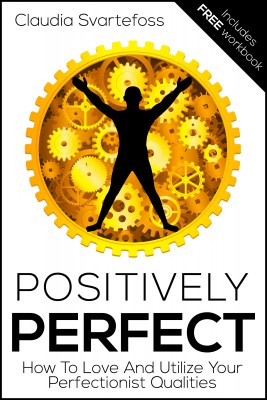The realistic perspective
Once I’ve realized settling for less just wasn’t going to be an option for me, since my desire for perfection was too strong, I started observing the reality from a more objective perspective. I wasn’t only looking at my own experience; I was also looking around me. I was paying attention to what beliefs others held and how they felt about their lives.
This post contains Amazon affiliate links, meaning I may earn a small commission if you purchase through my links, at no extra cost to you. Note: We aim to provide accurate product links, but some may occasionally expire or become unavailable. If this happens, please search directly on Amazon for the product or a suitable alternative.
There are successful people, and there are unsuccessful people. There are those who enjoy their lives, and those who don’t. This is the nature of our environment: not only contrasting in nature, but also providing us with the variety that assists us perfectly in choosing what we, individually, want according to our individual preferences, intentions, interests, and qualities.
When we are being realistic, we are mostly observing the reality and based on our tendencies, and we’ll draw a more pessimistic or a more optimistic conclusion. Because the realistic perspective either acknowledges the fact that there is the potential for success and for lack of success or leans toward one or the other perspective.
In my journey through the school system, I reached a point where I, through a negative experience, realized the reality: even though I had learned to settle for less, circumstances led me to achieve a success beyond my expectations. Because of my pessimistic perspective, I had given up on my grades, until one fine day, before an “all or nothing” exam when I got the “nothing” part: I wasn’t in the position to pass my exam to get into high school because a month earlier I had failed the simulating exam.
My new reality at that point was – I had to learn 4 years worth of math in order to pass this exam and get into high school, or else I’d have to find a job at 14 years old. At the time, high school wasn’t compulsory in the country I grew up in. For that one month, I learned everything I possibly could, and I ended up getting a grade that landed me 4th place in my new high school class. There was no denying it: pessimism was limiting my experience and my abilities because even though I didn’t believe I could pass the exam one month later, I ended up succeeding in spite of everyone, including my own beliefs at the time.
What’s interesting about the realistic perspective is that sometimes, in a specific situation, we really do want to have it. We want to be objective; we want to look at the reality and draw a conclusion so we can then move forward, one way or another, in our journey.
Here’s what I mean by this. There have been times when I was having this pessimistic, reluctant perspective and as I was meeting a new friend, I was getting ready to be ok with disappointment. I had no reason to do that, not initially, but still, my perspective was limiting my experience and my focus was on what the other person wasn’t doing “right.”
In this case, a realistic perspective can help, because we really want to be fair: “Is this person really as disappointing as I perceive them to be?” The answer is most likely no, but it can happen that even though this person is wonderful, they are not a match for you. They can remain wonderful even if you can’t maintain your relationship with them, and it’s not an either-or case.
And then, there have been times when I was having an optimistic, eager perspective as I was meeting a new friend, and I was thinking of all the amazing new possibilities. While I did have reasons to do that since well-being is the basis of our environment and our basis as human beings, I was sometimes turning a blind eye to the reality that they were not a real match to my experience.
It happens sometimes that in my optimism, I tend to overcompensate for others and ignore certain things. But eventually, there comes a point when the realistic perspective is the one that’s most beneficial to realize whether continuing the relationship is really what’s best for me, and ultimately, for the other person as well.
The optimistic:
Once I learned about the choice and power of focusing my thoughts, I started practicing focusing on the positive aspects of my life. At first, they seemed few and relatively insignificant, but as I kept practicing, I felt as if a veil had been lifted and my mind and eyes were finally clear.
It’s quite easy to get caught up in solving problems but there’s so much more to our reality than problems. There are so many wonderful things, and people, and circumstances, and all we ever have to do is turn our attention toward those things, and people, and circumstances.
The optimistic perspective makes us feel empowered and wonderful, and eager about ourselves, those around us, our successes. Indeed, there is always the potential to succeed or to “fail,” but being optimistic really gets our creative juices flowing.
We feel this natural energy surge that compels us to take action, to move forward, and to disregard the glitches that come along the way because we feel confident in our ability to solve them and to persevere.
Being optimistic is the fuel that keeps us going even if things don’t turn out the way we hoped or planned, the first time. There is always more learning, more improvement, more growth to be experienced and enjoyed. And there is always more contrast to be experienced as well. Having an optimistic perspective in alignment with our success ensures we stay on track and remember that it is, indeed, well-being, happiness, and empowerment that are the natural basis of our environment and our nature as a part of our environment.
While I was in university, I kept reaching for the best marks, once again. And once again, I could never get the perfect “10” I always wanted. But what I learned from this, and what I know now is that there is far more to learning than our artificially established goals or deadlines. It’s wonderful to reach for a goal and to achieve it, and others did achieve the perfect “10.” But my lesson was in achieving the goal of happiness and perfection by enjoying myself throughout the learning process and not struggling to meet the end result.
And my optimism now helps me understand there’s always more to be experienced and enjoyed. It helps me remember that sometimes it’s easy to get caught up in immediate goals, but there’s always a bigger, better lesson we must learn that leads us to even bigger success.
Your Perspective Matters Because It Brings Diversity And Variety To Our Lives
What we want to remember is that while our success is ensured, the basis of our environment is not only well-being but also variety. Each and every one of these different perspectives has its own role and purpose.
The pessimistic perspective is a natural result of negative focus and it limits our experience of the reality. But it can also teach us, once we’ve improved our state of being and mindset, that negative experiences are one of the many ways through which we grow, evolve, and expand as human beings. Yes, we can say “I’d really love to grow by only having loving experiences,” but without the contrasting part of the equation, we wouldn’t be able to tell it’s a loving experience.
The optimistic perspective is a natural result of understanding the well-being basis of our environment and of ourselves, as a natural part of our environment. It feels wonderful to be in alignment with our success and to focus on the many wonderful and amazing things existent in our lives and lying ahead of us. It’s how we want to see ourselves and our reality, for the most part, because it provides us with this natural feeling of empowerment that leads us to our success.
The realistic perspective is a natural logical step between the two contrasting perspectives that assist us in moving toward improvement. When we are being pessimistic, we really want to accept the reality that there is a lot of success out there and that we can choose it, even though we haven’t done it so far, for whatever reasons. And when we are being optimistic to the point where we are trying to ignore the reality and our potential for improvement, we really want to accept the fact that there is always more to be experienced. And while sometimes we move from better to even better, other times we move from not so good, to good.
Remember that we are always guided and inspired toward what’s most beneficial for us, individually, according to where we are in relation to where we want to be. Listen to that guidance and move forward. There is always more to experience, to create, to enjoy. Your perspective matters.
I would love to hear your thoughts, opinion, and experience with these different perspectives and why these matter. Which perspective do you think you are experiencing right now? How do you feel about it? What do you feel inspired toward?
Please feel welcome to share with us in the comments below.
Photo credit: Visualhunt










